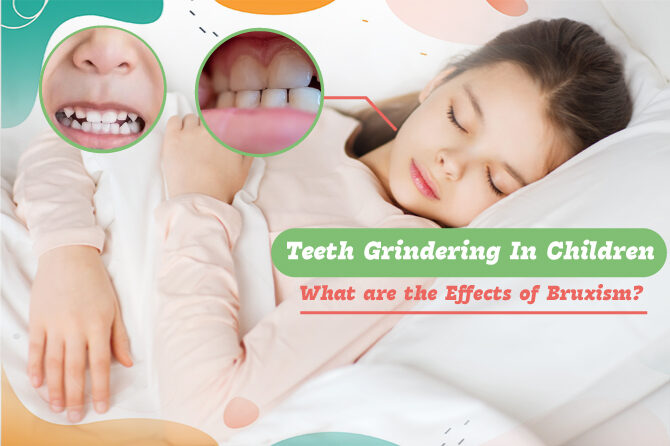
Teeth Grinding in Children: What are the Effects of Bruxism?
Why do children grind their teeth at night? Does bruxism result from tooth issues, other disorders, or an unconscious response to stress and anxiety? What might be the causes of youngsters grinding their teeth? A range of factors can contribute to parafunctional involuntary behavior, known as bruxism. It is a typical occurrence in young children and is categorized as a sleep problem. Both the primary and secondary forms of this illness are present. Read on to find out more.
Overview
When teeth grinding, also known as bruxism, wears away tooth enamel and results in chronic facial or dental pain, it poses a severe dental risk. Unbelievably, bruxism in children is rather prevalent. Learn about bruxism and what you can do to help your child by reading about it.
Causes of Bruxism
According to various studies, two to three out of ten children have bruxism, but the majority will eventually outgrow it. The actual etiology of bruxism is unknown. However, misaligned teeth are a leading candidate. Children who grind their teeth while they sleep frequently do it because they are in pain, while other kids may do it to relieve anxiety or tension. ADHD, cerebral palsy, or even an adverse drug reaction might cause teeth grinding and clenching.
The main symptoms of bruxism are headaches, earaches, facial pain, and jaw issues. Your youngster might shatter or chip a tooth if you don’t catch it immediately. Even if your child has “baby” teeth, it’s important to determine if they have the issue.
Short-Term Effects
Children who grind their teeth at sleep have headaches or pain in or around the ear due to the strain on their jaw. The abrasion of the enamel on the teeth caused by grinding can also make it uncomfortable to chew or increase the sensitivity of the teeth to heat and cold. A child’s doctor might need to modify or add medicines if their medication or another medical condition is the cause of the grinding.
Long-Term Effects
Children who continue to grind their teeth may have some long-term repercussions. If a child continues to clench and grind their teeth for an extended period, severe damage is done to the teeth. The enamel will deteriorate, and the teeth may also crack, chip, or flatten. There is a probability of getting temporomandibular joint conditions in people who grind their teeth for an extended period and frequently (TMD). TMD exacerbates jaw pain and can make it challenging for children to chew or fully open their mouths.
How to Find Out If Your Child Has Bruxism?
It might be difficult to tell if your child has bruxism because they frequently are unaware that they grind their teeth. Ask a sibling who shares their room with them or check on them at night to see if they make grinding noises while sleeping.
Anxiety can affect kids just like it does adults. Does your kid have any particular worries or resentments? It’s time to notice if these feelings are accompanied by teeth grinding while they’re sleeping. You might need to address the underlying issue with more medical care or stress-relieving measures, such as a warm bath or calming music before bed.
Your child may complain of pain in their ears, cheeks, jaw, or neck if they are bruxing, which can happen when they are awake and asleep. Make an appointment with the dentist and take those reports carefully. Your child’s dentist can identify whether bruxism is the cause of facial pain and then prescribe a course of action or treatment.
How to Stop a Child From Grinding Their Teeth at Night?
Make an appointment for a dental examination if your child is bruxing to receive a proper diagnosis and additional care. Batteries-operated toothbrushes can help people protect their teeth even more by limiting overly vigorous brushing. Your dentist may order a custom mouthguard to stop grinding and nighttime pain.
By assisting your child in dealing with worry healthily, you can treat bruxism in kids caused by stress. The good news is that most children outgrow their tendency to grind their teeth. However, it doesn’t hurt to schedule that initial consultation with the dentist so they can identify the issue and help you determine the best course of action.
How Is Bruxism Treated?
Dentists may recommend a specialized night guard if a child’s teeth-grinding and clenching hurts their cheeks and jaw or harms their teeth. The night guard is comparable to the mouthpieces athletes wear to protect their teeth and is molded to a child’s teeth. While getting acclimated to a night guard might be challenging, most people find it works well.
Lastly,
A pediatric dentist can create a strategy to treat bruxism, stop teeth clenching, and promote restful sleep for everyone. Assistance is available if you think your child may be grinding their teeth. Make an appointment at one of the best dental Clinic for children: Kids Dental Studio. Preschool and school-aged children, especially those with special healthcare needs, receive preventive and rehabilitative dental care from Dr. Umangi Lekhadia and Dr. Kisha Mehta at Kids Dental Studio.
Leave a reply
Leave a reply